
SDS C6 QUIKRETE Companies, LLC 3/11/2019
Page 1 of 11
C6: Portland Cement Based Concrete Products
SAFETY DATA SHEET
(Complies with OSHA 29 CFR 1910.1200)
SECTION I: PRODUCT IDENTIFICATION
The QUIKRETE
®
Companies Emergency Telephone Number
5 Concourse Parkway, Suite 1900 INFOTRAC (800) 535-5053
Atlanta, GA 30328 Information Telephone Number
(800) 282-5828
Revision: Mar-19
SDS C6
QUIKRETE
®
Product Name Item #(s)
Fast-Setting Concrete Mix 1004-50, -60
All-Star Fast Setting Concrete Mix 1004-50
Commercial Grade FastSet
TM
Concrete Mix 1004-51
Post Haste 1004-65
Q-MAX Pro Concrete Mix 1004-81
Commercial Grade Fast Setting Pro Concrete Mix 1004-84
All-Star 10 Minute Instant Post Mix 1005-51
Fence & Post Mix 1105-30
FastSet
TM
Water-Stop Cement –Zip & Mix 1121-15
Commercial Grade FastSet
TM
Cement 1124-92
Hydraulic Water Stop 1126-00
Concrete Resurfacer 1131-40
Recap Concrete Resurfacer
Multipurpose Concrete Resurfacer 1131-45
Bonded Topping Mix 1133-04, 1018, 1017
FastSet
TM
Stucco Patch 1139-92
Architectural Finish 1220-55
Commercial Grade FastSet
TM
Repair Mortar – Zip And Mix 1241
Commercial Grade FastSet
TM
Repair Mortar 1241-60
Polymer Modified Structural Concrete – Extended Set 1242-85
Commercial Grade FastSetTM Polymer Modified DOT Mix 1244-54
Commercial Grade FastSet
TM
DOT Mix 1244-56
Commercial Grade FastSet
TM
DOT Deck Repair – Polymer Modified 1244-58
Commercial Grade FastSet
TM
DOT Mix – Extended 1244-81
Commercial Grade FastSet
TM
Non-Shrink Grout 1585-09, -20, -50
Commercial Grade FastSet
TM
All-Crete 1585-59
Mix 801 FastSet
TM
DOT PM Overlay NR801552/80801552
Rapid Road Repair – CA

SDS C6 QUIKRETE Companies, LLC 3/11/2019
Page 2 of 11
Product Use: Portland cement-based, rapid-setting materials for general construction or repair.
See most current revision of this document at www.QUIKRETE.com.
SECTION II - HAZARD IDENTIFICATION
Hazard-determining components of labeling: Silica, Portland cement
2.1 Classification of the substance or mixture
Carcinogen – Category 1A
Skin Corrosion – Category 1B
Skin Sensitization – Category 1B
Specific Target Organ Toxicity Repeat Exposure – Category 1
Specific Target Organ Toxicity: Single Exposure – Category 3
2.2a Signal word DANGER!
2.2b Hazard Statements
May cause cancer through chronic inhalation
Causes severe skin burns and serious eye damage
May cause an allergic skin reaction
Causes damage to lungs through prolonged or repeated inhalation
May cause respiratory irritation
2.2c Pictograms
2.2d Precautionary statements
Do not handle until all safety precautions have been read and understood.
Wear impervious gloves, such as nitrile. Wear eye protection, protective clothing and rubber boots.
Do not eat, drink or smoke when using this product.
Wash thoroughly after handling.
Use only in a well-ventilated area.
Do not breathe dust.
If swallowed: Rinse mouth. Do NOT induce vomiting.
If inhaled: Remove person to fresh air and keep comfortable for breathing.
If in eyes: Rinse cautiously with water for several minutes. Remove contact lenses, if present and

SDS C6 QUIKRETE Companies, LLC 3/11/2019
Page 3 of 11
easy to do. Continue rinsing.
If on skin (or hair): Remove immediately all contaminated clothing and wash before re-use. Rinse
skin or hair with water.
If significant skin irritation or rash occurs: get medical advice or attention.
Immediately seek medical advice if symptoms are significant or persist.
Store in a well-ventilated place. Keep container tightly closed.
Dispose of contents/containers in accordance with all regulations.
2.3 Additional Information
The Portland cement in this product can cause serious, potentially irreversible damage to skin, eye,
respiratory and digestive tracts due to chemical (caustic) burns, including third degree burns.
Burns from Portland cement may not cause immediate pain or discomfort. You cannot rely on pain
to alert you to cement burns. Therefore precautions must be taken to prevent all contact with
Portland cement. Cement burns can become worse even after contact has ended. If there is
contact with this product, immediately remove all product from body and thoroughly rinse with water.
If you experience or suspect a cement burn or inflammation you should immediately see a health
care professional.
Skin burns and irritation may be caused by brief exposure, though often are caused by extended
exposure of 15 minutes, an hour, or longer. Interaction of Portland cement with water or sweat
releases a caustic solution which produces the burns or irritation. Any extended exposure should be
treated as though a burn has occurred until determined otherwise.
Skin contact with Portland cement can also cause inflammation of the skin, referred to as dermatitis.
Signs and symptoms of dermatitis can include itching, redness, swelling, blisters, scaling, and other
changes in the normal condition of the skin. Signs and symptoms of burns include the above and
whitening, yellowing, blackening, peeling or cracking of skin.
The Portland cement in this product may cause allergic contact dermatitis in sensitized individuals.
This overreaction of the immune system can lead to severe inflammation. Sensitization may result
from a single exposure to the low levels of Cr(VI) in Portland cement or repeated exposures over
months or years. Sensitization is long lasting and, after sensitization, even very small quantities can
trigger the dermatitis. Sensitization is uncommon. Individuals who experience skin problems,
including seemingly minor ones, are advised to seek medical attention.
2.3a HNOC – Hazards not otherwise classified: Not applicable
2.3b Unknown Acute Toxicity: None

SDS C6 QUIKRETE Companies, LLC 3/11/2019
Page 4 of 11
SECTION III - HAZARDOUS INGREDIENTS/IDENTITY INFORMATION
Hazardous Components CAS No. % by Weight
Sand, Silica, Quartz 14808-60-7 40-70*
Portland Cement 65997 15 1 10-30*
Calcium Sulfoaluminate 65997-16-2 10-30*
Calcium Aluminate 12042-68-1 5-10*
Calcium Sulfate 10101-41-4 1-5*
Limestone Dust 01317-65-3 1-5*
*The concentrations ranges are provided due to batch-to-batch variability.
None of the constituents of this material are of unknown toxicity.
SECTION IV – FIRST AID MEASURES
4.1 Description of the first-aid measures
General information:
After inhalation: Remove person to fresh air. If breathing is difficult, administer oxygen. If not
breathing, give artificial respiration. In case of unconsciousness, place patient stably in side position
for transportation.
After skin contact: Wash skin with cool water and pH-neutral soap or a mild detergent. If
significant skin irritation or rash occurs: get medical advice or attention.
After eye contact: Rinse cautiously with water for several minutes. Remove contact lenses, if
present and easy to do. Continue rinsing.
After swallowing: Do not induce vomiting. If conscious, have the victim drink plenty of water and
call a physician immediately. Never give anything by mouth to an unconscious person.
4.2 Most important symptoms/effects, acute and delayed
Inhalation: May cause respiratory tract irritation. Causes damage to organs through prolonged or
repeated inhalation. This product contains crystalline silica. Prolonged or repeated inhalation of
respirable silica from this product can cause silicosis.
Skin contact: The Portland cement in this product can cause serious, potentially irreversible
damage to skin, eye, respiratory and digestive tracts due to chemical (caustic) burns, including third
degree burns.
Burns from Portland cement may not cause immediate pain or discomfort. You cannot rely on pain
to alert you to cement burns. Therefore precautions must be taken to prevent all contact with
Portland cement. Cement burns can become worse even after contact has ended. If there is
contact with this product, immediately remove all product from body and thoroughly rinse with water.
If you experience or suspect a cement burn or inflammation you should immediately see a health
care professional.

SDS C6 QUIKRETE Companies, LLC 3/11/2019
Page 5 of 11
Skin burns and irritation may be caused by brief exposure, though often are caused by extended
exposure of 15 minutes, an hour, or longer. Interaction of Portland cement with water or sweat
releases a caustic solution which produces the burns or irritation. Any extended exposure should be
treated as though a burn has occurred until determined otherwise.
Skin contact with Portland cement can also cause inflammation of the skin, referred to as dermatitis.
Signs and symptoms of dermatitis can include itching, redness, swelling, blisters, scaling, and other
changes in the normal condition of the skin. Signs and symptoms of burns include the above and
whitening, yellowing, blackening, peeling or cracking of skin.
The Portland cement in this product may cause allergic contact dermatitis in sensitized individuals.
This overreaction of the immune system can lead to severe inflammation. Sensitization may result
from a single exposure to the low levels of Cr(VI) in Portland cement or repeated exposures over
months or years. Sensitization is long lasting and, after sensitization, even very small quantities can
trigger the dermatitis. Sensitization is uncommon. Individuals who experience skin problems,
including seemingly minor ones, are advised to seek medical attention.
Eye Contact: Causes serious eye damage. Symptoms may include discomfort or pain, excess
blinking and tear production, with marked redness and swelling of the conjunctiva.
Ingestion: May be harmful if swallowed. Ingestion may cause discomfort and/or distress, nausea
or vomiting.
4.3 Indication of immediate medical attention and special treatment needed:
Immediately seek medical advice if symptoms are significant or persist.
SECTION V - FIRE FIGHTING MEASURES
5.1 Flammability of the Product: Non-flammable and non-combustible
5.2 Suitable extinguishing agents: Treat for surrounding material
5.3 Special hazards arising from the substance or mixture: None
5.3a Products of Combustion: None
5.3b Explosion Hazards in Presence of Various Substances: Non-explosive in presence of
shocks
SECTION VI – ACCIDENTAL RELEASE MEASURES
6.1 Personal precautions, protective equipment and emergency procedures: Wear personal
protective equipment (See section VIII). Keep unprotected persons away.
6.2 Methods and material for containment and cleaning up:

SDS C6 QUIKRETE Companies, LLC 3/11/2019
Page 6 of 11
Do not allow to enter sewers/ surface or ground water. Dispose of unwanted materials and
containers properly in accordance with all regulations.
SECTION VII - PRECAUTIONS FOR SAFE HANDLING AND STORAGE
7.1 Handling
Precautions for safe handling: Ensure good ventilation/exhaustion at the workplace. DO NOT
BREATHE DUST. In dusty environments, the use of an OSHA, MSHA or NIOSH approved
respirator and tight fitting goggles is recommended. Wear appropriate PPE (See section 8).Do not
mix with other chemical products, except as indicated by the manufacturer. Do not get in eyes, on
skin or clothing. Good housekeeping is important to prevent accumulation of dust.
7.2 Storage
Requirements to be met by storerooms and receptacles: No special requirements.
Information about storage in one common storage facility: Not required.
Further information about storage conditions: Keep out of the reach of children. Keep container
tightly closed and prevent exposure to humidity. Do not allow water to contact the product until time
of use to preserve product utility.
SECTION VIII – EXPOSURE CONTROL MEASURES / PERSONAL PROTECTION
8.1 Components with limit values that require monitoring at the workplace:
Hazardous Components CAS No. PEL (OSHA) TLV (ACGIH)
mg/M
3
mg/M
3
Silica Sand, crystalline 14808-60-7 0.05 0.025 (resp)
Portland Cement 65997-15-1 5 (resp) 15 (total) 10 (resp)
Calcium Sulfoaluminate 65997-16-2 15 10
Calcium Aluminate 12042-68-1 5 (resp) 15 (total) 1 (resp)
Calcium Sulfate 10101-41-4 5 (resp) 15 (total) 10 (resp)
Limestone Dust 01317-65-3 5 (resp) 15 (total) 10 (resp)
8.2 Exposure Controls
Use ventilation adequate to keep exposures below recommended exposure limits.
8.3 General protective and hygienic measures
Keep away from foodstuffs, beverages and feed. Immediately remove all soiled and contaminated
clothing. Wash hands before breaks and at the end of work. Avoid contact with the eyes and skin.
8.3a Personal protective equipment
Protection of hands and feet:

SDS C6 QUIKRETE Companies, LLC 3/11/2019
Page 7 of 11
Wear gloves of adequate length to offer appropriate skin protection from splashes. Nitrile, Butyl and
PVC gloves have been found to offer adequate protection for incidental contact. Wear rubber boots
when stepping in concrete. You cannot rely on pain to alert you to cement burns. Portland cement
can cause dermatitis or sensitization.
Eye protection:
Wear approved eye protection properly fitted dust- or splash-proof chemical safety glasses.
Respiratory protection:
A NIOSH-approved dust mask or filtering face piece is recommended in poorly ventilated areas or
when permissible exposure limits may be exceeded. Respirators should be selected by and used
under the direction of a trained health and safety professional, following requirements found in
OSHA’s respirator standard (29 CFR 1910.134) and ANSI’s standard for respiratory protection
(Z88.2).
SECTION IX - PHYSICAL/CHEMICAL CHARACTERISTICS
General Information
Appearance Form: Granular Solid
Color: Gray to gray-brown colored
Odor: None
pH-value at 20°C (68 °F): 13 (10%)
Boiling point/Boiling range: Not applicable
Flash point: Not applicable
Auto igniting: Product is not self-igniting
Vapor pressure at 21°C (70°F) Not available
Density at 25°C (77 °F): 2.6 to 3.15
Solubility in / Miscibility with
Water: Insoluble
VOC content: 0 g/L VOC
SECTION X – STABILITY AND REACTIVITY
10.1 Reactivity
No dangerous reaction known under conditions of normal use.
10.2 Chemical stability
Stable under normal storage conditions. Keep in dry storage.
10.3 Possibility of hazardous reaction
No dangerous reaction known under conditions of normal use.
10.4 Thermal decomposition / conditions to be avoided
No decomposition if used according to specifications.

SDS C6 QUIKRETE Companies, LLC 3/11/2019
Page 8 of 11
10.5 Incompatible materials
Contact of silica with powerful oxidizing agents such as fluorine, chlorine trifluoride, manganese
trioxide, or oxygen difluoride may cause fires
10.6 Hazardous Decomposition or By-products
Silica will dissolve in Hydrofluoric Acid and produce a corrosive gas – silicon tetrafluoride.
SECTION XI – TOXICOLOGICAL INFORMATION
11.1 Exposure Routes: Skin contact, skin adsorption, eye contact, inhalation, or ingestion.
11.2 Symptoms related to physical/chemical/toxicological characteristics:
Inhalation: May cause respiratory tract irritation. Causes damage to organs through
prolonged or repeated exposure. This product contains crystalline silica. Prolonged or
repeated inhalation of respirable silica from this product can cause silicosis.
Skin contact: Causes skin irritation. Handling can cause dry skin, discomfort, irritation, and
dermatitis. May cause sensitization by skin contact. Product becomes extremely alkaline
when exposed to moisture, and can cause alkali burns and affect the mucous membranes.
Eye Contact: Causes serious eye damage. Symptoms may include discomfort or pain,
excess blinking and tear production, with marked redness and swelling of the conjunctiva.
Ingestion: Harmful if swallowed. Ingestion may cause discomfort and/or distress, nausea or
vomiting.
11.3 Delayed, immediate and chronic effects of short-term and long-term exposure
Short Term
Skin Corrosion/Irritation: Causes severe skin burns.
Serious Eye Damage/Irritation: Causes severe eye damage.
Respiratory Sensitization: Not available
Skin Sensitization: May cause an allergic skin reaction.
Specific Target Organ Toxicity-Single Exposure: (Category 3) may cause respiratory
irritation.
Aspiration Hazard: Not available
Long Term
Carcinogenicity: May cause cancer through chronic inhalation.
Germ Cell Mutagenicity: Not available
Reproductive Toxicity: Not available
Specific Target Organ Toxicity- Repeated Exposure: (Category 1) Causes damage to lungs
through prolonged/repeated exposure
Synergistic/Antagonistic Effects: Not available.

SDS C6 QUIKRETE Companies, LLC 3/11/2019
Page 9 of 11
SECTION XII – ECOLOGICAL INFORMATION
12.1 Ecotoxicity
May cause long-term adverse effects to the aquatic environment. Do not allow undiluted product or
large quantities of it to reach ground water, water course or sewage system. Must not reach bodies
of water or drainage ditch undiluted or un-neutralized
12.2 Persistence and degradability
No further relevant information available.
12.3 Bioaccumulative potential:
No further relevant information available.
12.4 Mobility in soil
No further relevant information available.
12.5 Other Adverse Effects
No further relevant information available.
SECTION XIII – DISPOSAL CONSIDERATIONS
13.1 Waste Disposal Method
The packaging and material may be land filled; however, material should be covered to minimize
generation of airborne dust. This product is not classified as a hazardous waste under the authority
of the RCRA (40CFR 261) or CERCLA (40CFR 117&302). Disposal must be made in accordance
with local, state and federal regulations.
13.2 Other disposal considerations
Uncleaned packaging
Recommendation: Disposal must be made in accordance with local, state and federal regulations.
Recommended cleansing agent: Water, if necessary with cleansing agents.
SECTION XIV – TRANSPORT INFORMATION
DOT (U.S.) TDG (Canada)
UN-Number Not Regulated Not Regulated
UN proper shipping name Not Regulated Not Regulated
Transport Hazard Class(es) Not Regulated Not Regulated
Packing Group (if applicable) Not Regulated Not Regulated
14.1 Environmental hazards:

SDS C6 QUIKRETE Companies, LLC 3/11/2019
Page 10 of 11
Not Available
14.2 Transport in bulk according to Annex II of Marpol 73/78 and the IBC Code
Not available
14.3 Special precautions for user
Do not handle until all safety precautions have been read and understood.
SECTION XV – OTHER REGULATORY INFORMATION
15.1 Safety, Health and Environmental Regulations/Legislations specific for the chemical
Canada
WHMIS Classification: Considered to be a hazardous material under the Hazardous
Products Act as defined by the Controlled Products Regulations and subject to the
requirements of Health Canada’s Workplace Hazardous Material Information (WHMIS). This
document complies with the WHMIS requirements of the Hazardous Products Act (HPA) and
the CPR.
15.2 US Federal Information
SARA 302/311/312/313 Components
No chemicals in this material are subject to the reporting requirements of SARA Title III,
Section 302, 311, 312 or 313.
RCRA: Crystalline silica (quartz) is not classified as a hazardous waste under the Resource
Conservation and Recovery Act, or its regulations, 40 CFR §261 et seq.
CERCLA: Crystalline silica (quartz) is not classified as a hazardous substance under
regulations of the Comprehensive Environmental Response Compensation and Liability Act
(CERCLA), 40 CFR §302.
Emergency Planning and Community Right to Know Act (SARA Title III): Crystalline
silica (quartz) is not an extremely hazardous substance under Section 302 and is not a toxic
chemical subject to the requirements of Section 313.
FDA: Silica is included in the list of substances that may be included in coatings used in food
contact surfaces, 21 CFR §175.300(b)(3)(xxvi).
NTP: Respirable crystalline silica, primarily quartz dusts occurring in industrial and
occupational settings, is classified as Known to be a Human Carcinogen.
OSHA Carcinogen: Crystalline silica (quartz) is not listed.
15.3 State Right to Know Laws
California Prop. 65 Components

SDS C6 QUIKRETE Companies, LLC 3/11/2019
Page 11 of 11
WARNING: This product can expose you to chemicals including crystalline silica which
is known to the State of California to cause cancer and Portland cement which is known to the
State of California to cause birth defects or other reproductive harm. For more information go
to www.P65Warnings.ca.gov.
California Inhalation Reference Exposure Level (REL): California established a chronic
REL of 3 µg for silica (crystalline, respirable). A chronic REL is an airborne level of a
substance at or below which no adverse health effects are anticipated in individuals
indefinitely exposed to the substance at that level.
Massachusetts Toxic Use Reduction Act: Silica, crystalline (respirable size, <10 microns)
is “toxic” for purposes of the Massachusetts Toxic Use Reduction Act.
15.4 Global Inventories
DSL All components of this product are on the Canadian DSL list.
TSCA No.: Crystalline silica (quartz) appears on the EPA TSCA inventory under the CAS No.
14808-60-7. All constituents are listed in the TSCA inventory.
SECTION XVI – OTHER INFORMATION
Last Updated: March 11, 2019
NOTE: The information and recommendations contained herein are based upon data believed to be
correct. However, no guarantee or warranty of any kind, express or implied, is made with respect to
the information contained herein. We accept no responsibility and disclaim all liability for any
harmful effects which may be caused by exposure to silica contained in our products.
Prepared by The QUIKRETE
Companies, LLC
End of SDS
-
 1
1
-
 2
2
-
 3
3
-
 4
4
-
 5
5
-
 6
6
-
 7
7
-
 8
8
-
 9
9
-
 10
10
-
 11
11
Quikrete 1585-09 User guide
- Type
- User guide
Ask a question and I''ll find the answer in the document
Finding information in a document is now easier with AI
Related papers
-
Quikrete 110260 User manual
-
Quikrete 110140 User guide
-
Unbranded 112494 Installation guide
-
Unbranded 112494 Installation guide
-
Quikrete 115350 Installation guide
-
Quikrete 865032 Installation guide
-
Quikrete 212194 Installation guide
-
Quikrete 873026 Installation guide
-
Quikrete 990210 Installation guide
-
Quikrete 862009 User guide
Other documents
-
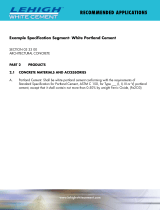 TXI 4613 Installation guide
TXI 4613 Installation guide
-
Hasbro Vaporizer Operating instructions
-
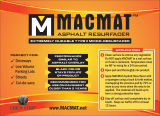 MACMAT-AR X9510 Installation guide
MACMAT-AR X9510 Installation guide
-
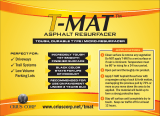 T-MAT X9500 Installation guide
T-MAT X9500 Installation guide
-
Unbranded 0010294000 Installation guide
-
Hasbro Liquidator Operating instructions
-
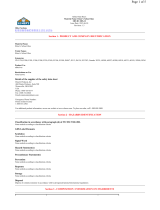 Elmer's 2022931 User guide
Elmer's 2022931 User guide
-
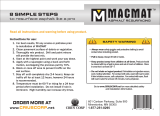 MACMAT-AR X9510 Operating instructions
MACMAT-AR X9510 Operating instructions
-
Greenlee Winter Gel Safety Owner's manual
-
Logan F300-6 Owner's manual















